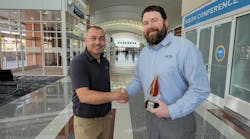The European Community is Banding Together to Prepare for the Future
September 2004
Traffic at European airports is increasing, which is leading to more jobs; however, young, uneducated applicants have a better chance of being hired if they have training in English and airport procedures before they apply. So the question is, how do you train people before the interview?
ELSY Program
A number of companies in France, Spain, Italy, Germany and Scotland/UK united in a project that not only answered this question, but also offered the opportunity for companies to give back to the community.
They began ELSY: Elaboration dun Syllabus multimedia aroportuaire pour les jeunes sans employ et peu qualifies. "ELSY stands for ... devising a multimedia syllabus for young people who are unemployed and under-qualified," explains a representative of Aircar, an airport transportation company.
"The ignorance of the English language is a barrier to recruitment in a European airport environment," she adds. Therefore ELSY needs to teach English and airport procedure, but also be easy to access and use.
"The idea is to put it on the web," says Christian Lespine, general secretary of the Europe Handling Groupe, who works at the Charles de Gaulle airport near Paris. "[Then it will] be open to every language used, especially in Europe."
The plan is to create video and language diagrams of four common airport jobs: ramp worker, bus driver, food worker and security guard. The multimedia program will be online and accessed through a website password or code. The learner can view the video, in English, and practice the terminology associated with the airport job. For example, says Lespine, a young man considering ramp work may log-on to the site and view a headset departure where he would be pushing back the aircraft while the engines start and be speaking to the Captain in English, the predominant language on an airport. This maneuver will be presented in a sequence of video and then he'll have the opportunity to do "karaoke," Lespine explains. The learner can view models of the words in English and repeat it back as many times as needed.
"Ground English [English used on the ramp] is a little bit special because you have dedicated words that you can find only on the airport," says Lespine, "towbar, for example." Teaching basic, tailored English needed by the specific airport trades encourages a rapid assimilation of the language, says the Aircar representative, and allows immediate communication in a professional context.
At completion of the training the learner should be able to interview for one of these jobs and demonstrate competency in the language and procedures used on the airport. "These are two very good arguments [with which] to approach a new job," says Lespine, "to say I know the phraseology and I know what the work on the airport [entails]."
Another application for the ELSY program would be refresher courses for employees. Either on breaks or during down times they could log-on to ELSY to improve their English and procedural knowledge adds Lespine, but the main application of the program is really before they come to the airport.
Current Phase
ELSY is currently in Phase 1 of production: information gathering.
Aircar, which provides ground transportation for passengers and crew at Paris airports, Roissy Charles de Gaulle and Orly, is currently involved in coordinating video of real-life crew transfer situations at and around the airport.
Europe Handling Group, which specializes in airport assistance, has recorded ground handlers doing their daily jobs and is working with a subcontractor for the phraseology that will be added to the bottom of the video.
If everything goes well, ELSY is planned for release in 2005. "I think that it's a very good use of European funds," says Lespine. It takes time, but the companies that are part of ELSY are helping young people find jobs in our developing airports. Hopefully, ELSY will give both young people and the airports a better future.




